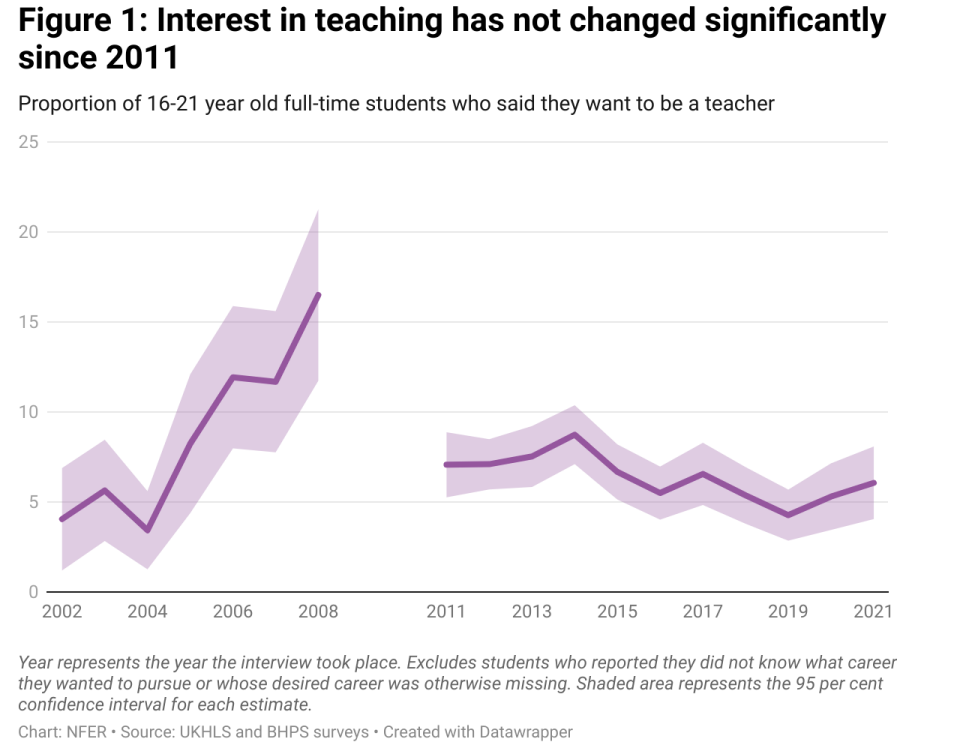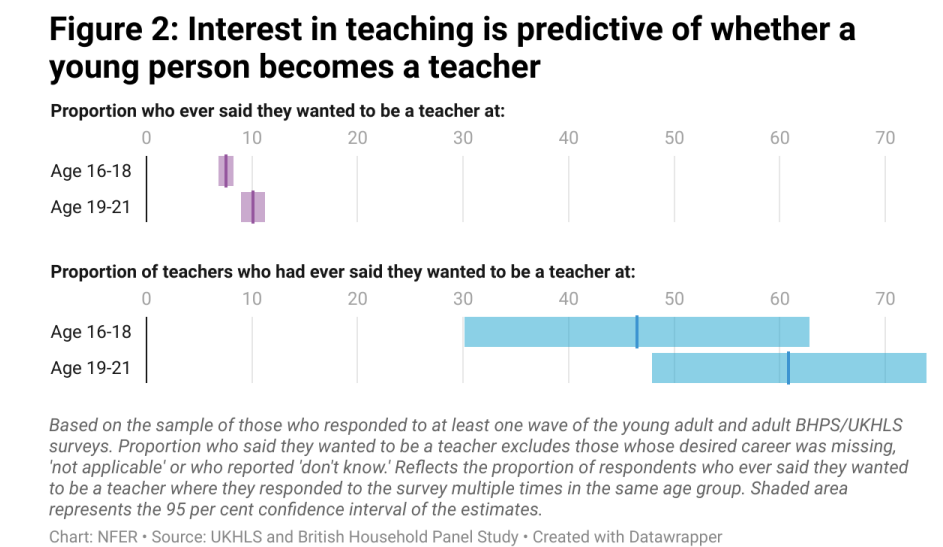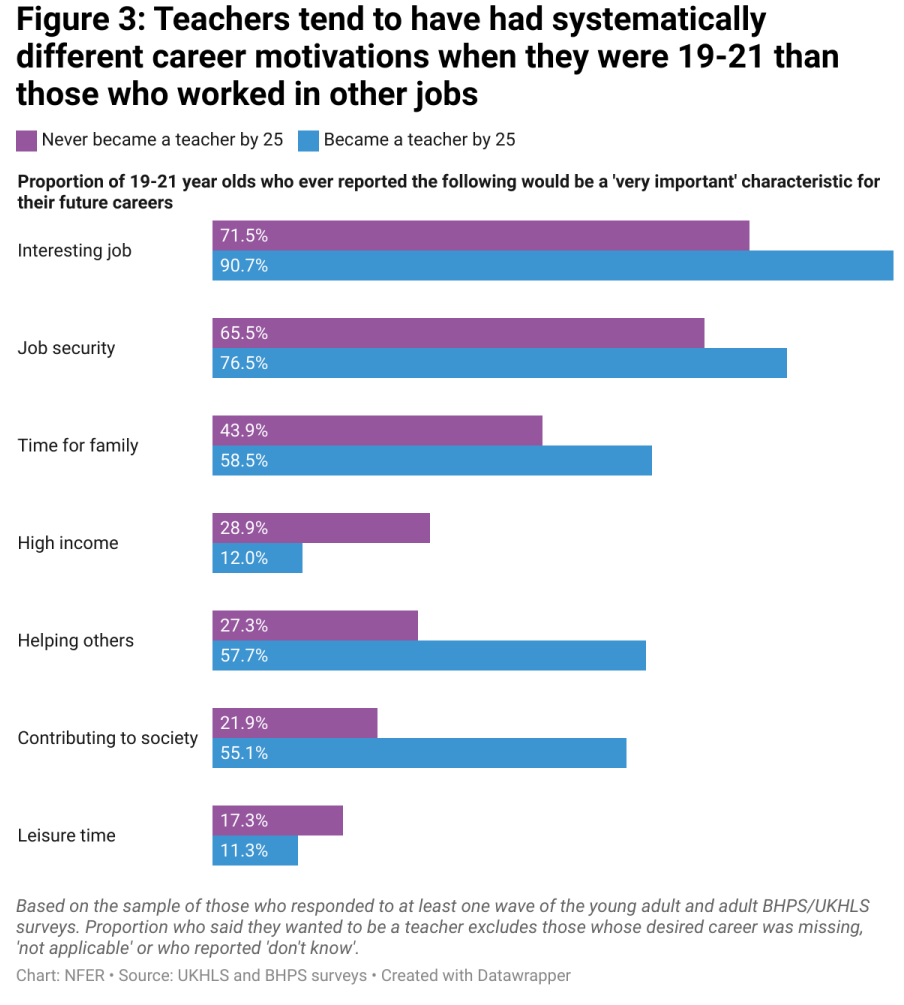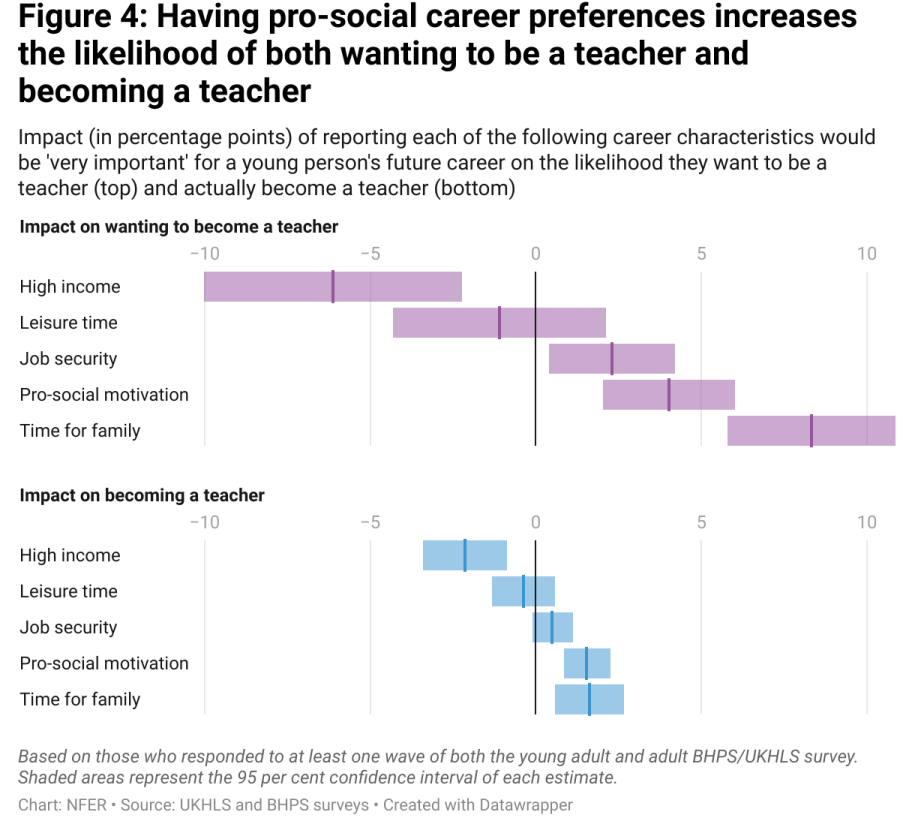Interest in a teaching career among young people has not shifted much over the past decade, suggesting issues such as high workload and a lack of flexibility are driving the recruitment crisis, a new report has found.
The National Foundation for Educational Research concluded that shifting career preferences were not to blame for “persistently sluggish” teacher recruitment.
The organisation recently predicted the government would miss its teacher recruitment target again for September – the 11th time in 12 years. This year, almost as many teachers left the profession as entered it.
Co-authors Dawson McLean and Jack Worth said the findings “affirm that addressing the deteriorating attractiveness of the teaching profession is key to solving the teacher shortage challenge”.
Paul Whiteman, general secretary of the NAHT school leaders’ union, said the study “offers welcome confirmation that interest in the profession among graduates has not waned, despite the severe recruitment and retention crisis schools are facing”.
“However, it shows that the new government has much to do to help improve the reality of the job and its terms and conditions if this interest is to be converted into an influx of new teachers attracted by the promise of a fulfilling, sustainable career.”
Their analysis was based on survey data, mainly collected from 2002 to 2023, focusing on responses from those aged 16 to 21 at the time.
They looked at the proportion of young people who said they wanted to be a teacher each year, and then checked what jobs they had when they were 22 to 25.
Interest in teaching steady since 2011
The analysis found little evidence graduates had become less interested in “pro-social” careers in recent years, suggesting other factors are at play.
Although the proportion of students who said they wanted to be teachers soared from around 4 per cent in 2002 to a peak of 16 per cent in 2008, interest fell and remained at around 6 per cent between 2011 and 2021.

The research found that interest in teaching tended to increase with age and that young peoples’ career preferences were predictive of whether they go on to become an educator.
Of those who became a teacher by the age of 25, 61 per cent had said that they wanted to when they were 19-21.

Make teaching competitive to meet 6,500 target
The new Labour government has made recruiting 6,500 new teachers one of its central missions.
The report warned new ministers must ensure teaching is a “competitive career option” if they want to hit their target.
“There is not an infinite supply of socially-motivated people entering the workforce,” the report warned, and teaching is not the only career attractive to those motivated towards a “pro-social” job.
Many also pursue jobs in nursing, healthcare and caring – sectors with their own recruitment challenges, the report added.
Improving the attractiveness of teaching by offering better pay or a more manageable workload could therefore expand the pool of graduates that can be recruited from.
This “could also have the added benefit of reducing recruitment pressures for other socially-oriented public service jobs,” the report added.
Teachers motivated by pro-social factors over pay
Teacher pay growth more closely matched average earnings growth in the early 2000s than in the 2010s, and a series of advertising campaigns were run over the earlier period, NFER noted.
Meanwhile, the Institute for Fiscal Studies found teacher pay fell by 6 per cent in real-terms since 2010.
But the NFER found teachers tended to have different career motivations when they were 19-21 than those who worked in other jobs, with ambition based on “pro social” factors a key difference.
Perhaps unsurprisingly, those who went on to become teachers were more motivated by “helping others” and “contributing to society”.
Just 12 per cent of those who became a teacher by the age of 25 said a high income would be important for their future careers, less than half the proportion who never became a teacher.

Those with “pro-social” career motivation are four percentage points more likely to report wanting to be a teacher and two percentage points more likely to actually become a teacher than those without, NFER modelling found.
While young people’s career preferences have not changed “dramatically” over time, there has been a slight increase in the proportion who think factors such as “helping others” and “contributing to society” are very important career considerations, the report states.
NFER also found that Gen Z youngsters, those born since 1997, are “slightly more likely to fit the motivational profile of a future teacher than Millennials”.

















Too many barriers put up by PGCE course leaders. My post-grad daughter was so keen to enter the teaching profession and tried so hard with several unis offering her major for teaching at secondary level, but all of them had such high entrance requirements, particularly around maths, even though she has Functional Skills 2 which is still listed on HMRC as being a full equivalent to GCSE maths. Other unis were very biased towards English literature (not her strength), despite advertising their course as English Language for secondary level. Endless barriers, so she gave up. No wonder there’s such a shortage of those entering teaching.
Should let the youngsters know about the potential to earn a ridiculous salary as a sociopathic MAT Director of Teaching and Learning or MAT CEO. That’ll sway them!